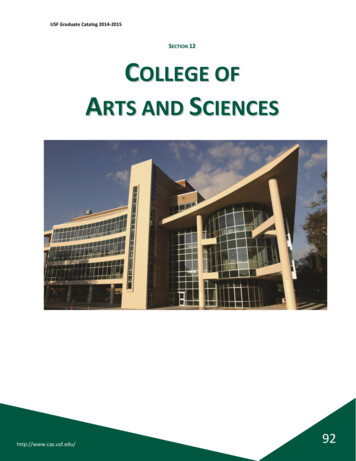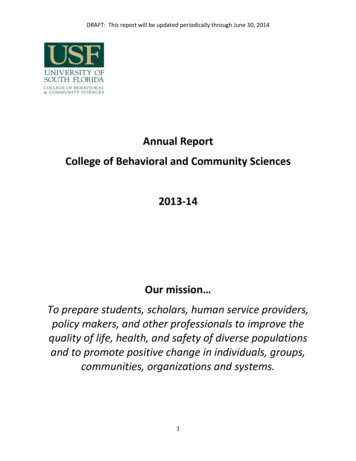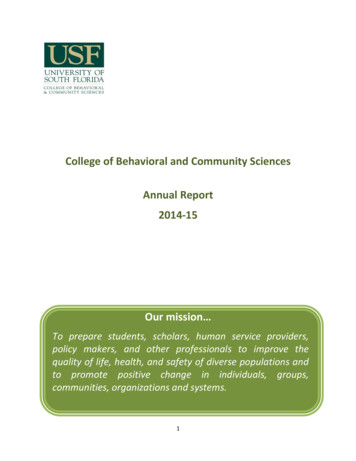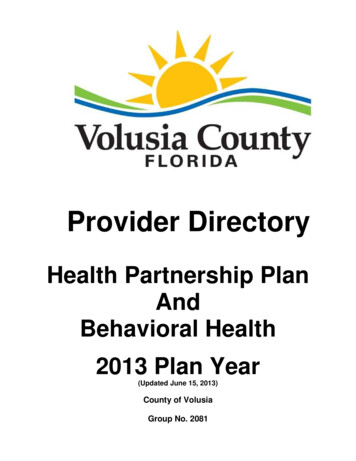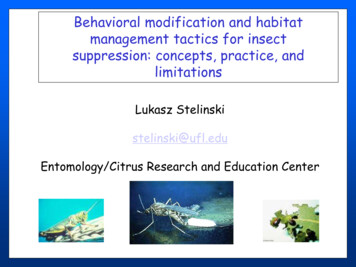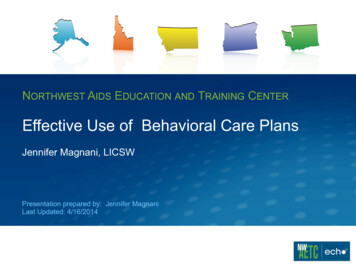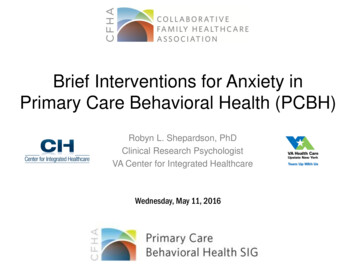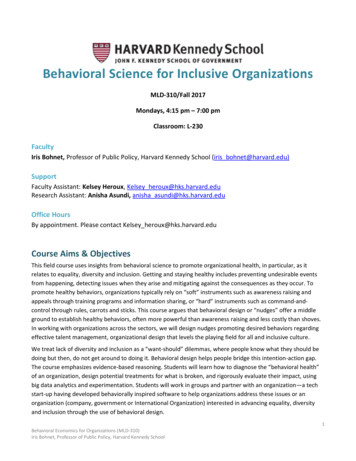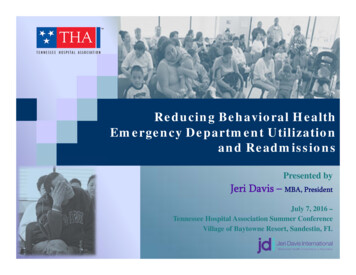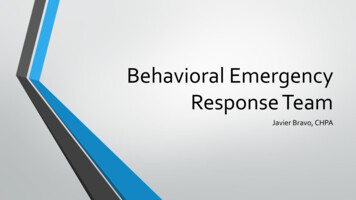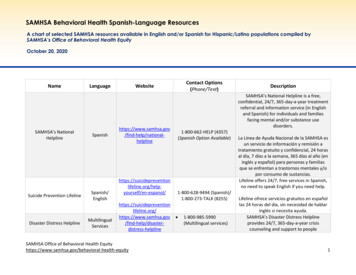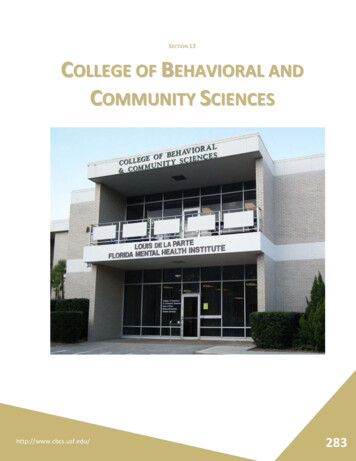
Transcription
SECTION 13COLLEGE OF BEHAVIORAL ANDCOMMUNITY SCIENCEShttp://www.cbcs.usf.edu/283
Changes to NoteThe follow curricular changes for the College of Behavioral and Community Sciences were approved by theUSF‐Tampa Graduate Council on the date noted.Program changesCommunication Sciences & Disorders (Ph.D.)change admissions requirements to allow application directly to Ph.D. bybaccalaureate students; adjust minimum hours accordingly3/21/11Criminal Justice Administration (CJA)Confirmation of admission deadline as August 12 for new applications4/30/11Rehabilitation and Mental Health Counseling (M.A.)Marriage & Family Therapy Concentration: change course requirements11/15/10Speech Language Pathology (MS)Increase practicum hours by 111/15/10Programs Placed Inactive/Closed for AdmissionSocial Work (Ph.D.) (SOK) (Eff spring 2011)2/21/11Certificate changesAddictions and Substance Abuse Couns. change requirementsBehavior Health Counselingchange curriculumMarriage and Familychange curriculum requirementsPositive Behavior SupportRemove pre‐req; add elective option11/15/105/16/119/20/109/20/10New CoursesMHS 6XXX Issues and Trends in Developmental DisabilitiesSPA 6535L Audiology Clinical Laboratory ISPA 6536L Audiology Clinical Laboratory IISPA 6307 Speech Perception and Sensorineural Hearing LossSPA 6393 Audiology Practice ManagementMHS 6601 Consultation and Collaborative Systems changeMHS 6410 Intensive Individualize Positive Behavior SupportMHS 6608 School‐wide Positive Behavior SupportMHS 6605 Addressing Behavior Challenges in Young 109/20/109/20/109/20/10Course changesGEY 6614 ‐ Aging and Mental Disorders‐ change descriptionSPA 5403 Lang Learning in the Sch Age Yrs remove pre‐req SPA 6410SPA 6410 Aphasiaremove pre‐req SPA 6106SPA 6565 Seminar in Dysphagiaremove pre‐req SPA f.edu/284
USF Tampa Graduate Catalog 2012‐2013Section 13 College of Behavioral and Community SciencesUniversity of South FloridaCollege of Behavioral and Community Sciences4202 E Fowler Ave MHC 1110Tampa, FL 33620Web address:Email:Phone:Fax:http://www.bcs.usf.eduSee departmental listings813‐974‐2365813‐974‐4699Interim College Dean:Associate Dean:Assistant Dean:Graduate Coordinator:Catherine BatscheCatherine BatscheCynthia StarkCatherine BatscheAccreditation:Accredited by the Commission on Colleges of the Southern Association of College and Schools (SACS). Contact theCollege for other accreditation information.Mission Statement:The College of Behavioral and Community Sciences prepares students, scholars, human service providers,policy makers, and other professionals to improve the quality of life, health, and safety of diverse populationsand to promote positive change in individuals, groups, communities, organizations and systems. Throughmultidisciplinary teaching and research, service, and engagement with community partners, the Collegefocuses on the rigorous development, dissemination/implementation, and analysis of innovative solutions tothe complex challenges that affect the behavior and well‐being of individuals, families, populations, and thecommunities in which we live.The College offers eight programs at the master’s level and seven programs at the doctoral level. Master’sprograms are available in Applied Behavior Analysis, Audiology (Post‐Baccalaureate), Aural Rehabilitation,Criminal Justice Administration, Criminology, Gerontology, Rehabilitation & Mental Health Counseling, SocialWork, and Speech‐Language Pathology. Doctoral programs are offered in Aging Studies, Audiology,Communication Sciences & Disorders, Criminology, and Social Work. Dual degrees are offered in SocialWork/Public Health at the master’s level and Audiology/Communication Sciences and Disorders at the doctorallevel.The College is also home to the Louis de la Parte Florida Mental Health Institute whose mission is to improvethe lives of individuals with mental, addictive, and developmental disorders. Graduate studies in BehavioralHealth are offered in collaboration with the College of Public Health at both the master’s and doctoral levelsand in collaboration with the College of Education at the doctoral level. The Institute houses a Research Library,a Behavioral Health Research Data Center, and a Survey Research Unit that can support the research thesesand dissertations of graduate students.http://www.cbcs.usf.edu/283
USF Tampa Graduate Catalog 2012‐2013Section 13 College of Behavioral and Community SciencesThe following are degree programs offered across programs and/or colleges.Degrees, Programs, and Concentrations:Master of Arts (M.A.)Applied Behavior Analysis (ABY)Criminal Justice Administration (CJA)Criminology (CCJ)Gerontology (GEY)Rehabilitation and Mental Health Counseling (REH)Addictions and Substance Abuse Counseling (ASA)Marriage and Family Therapy (MFL)Master of Science ‐ M.S.Audiology (Post‐Bacc) (AUD)Aural (Re) Habilitation (Post Bac) (ARH)Speech‐Language Pathology (SPP)Master of Social Work ‐ M.S.W.Social Work – (SOK)Doctor of Audiology ‐Au.D.Audiology (AYD)Doctor of Philosophy ‐Ph.D.Aging Studies (AGE)Communication Sciences and Disorders (CSD)Hearing Sciences and Audiology (HAS)Neurocommunicative Sciences (NSC)Speech‐Language Sciences (SLS)Criminology (CCJ)Social Work (SOK)Dual Degree Programs:Master of Social Work ‐ M.S.W.Social Work/Public Health Dual Degree MSW/MPH (Maternal and Child Health)(Behavioral Health)Doctor of Audiology ‐Au.D.Audiology/Communication Sciences and Disorders – (AUD/CSD) Dual ProgramDoctor of Philosophy ‐Ph.D.Audiology/Communication Sciences and Disorders (AUD/CSD) – Dual ProgramGraduate Certificates Offered:See Graduate Certificates SectionInterdisciplinary OpportunitiesThe College of Behavioral and Community Sciences (BCS) works with other colleges in interdisciplinary efforts,such as the jointly offered specialty concentration in Behavioral Health as part of the master’s and doctoralprograms in the Department of Community and Family Health (DCFH) in the College of Public Health (COPH).For information about this, and other opportunities, contact either BCS or COPH for information.http://www.cbcs.usf.edu/284
USF Tampa Graduate Catalog 2012‐2013Section 13 College of Behavioral and Community SciencesCOLLEGE REQUIREMENTSThesis EnrollmentUpon successful completion of all M.A./M.S. degree requirements except for thesis, Behavioral & CommunitySciences graduate students must enroll in a minimum of two (2) credit hours of Thesis each semester (exceptSummers) until the completion of the master’s degree.Dissertation EnrollmentDoctoral students who have been admitted to candidacy, are required to accumulate a minimum of six (6)credit hours of Dissertation during each previous 12‐month period (previous three 3 terms, e.g., Fall, Spring,Summer) until the degree is granted.http://www.cbcs.usf.edu/285
USF Tampa Graduate Catalog 2012‐2013Section 13 College of Behavioral and Community SciencesAbout the CatalogThe University of South Florida Graduate Catalog is organized with the degree programs offered listed in thesection of the College that offers them. For example, the Master of Science degree with a “program” (alsoknown as major) in Biology is listed in the College of Arts and Sciences section. Some colleges offer areas ofspecialization, or “concentrations” within a degree program.PROGRAMSAGING STUDIES PROGRAMGreen denotesProgram (or Major)Doctor of Philosophy (Ph.D.) DegreeBlack denotes degreeDEGREE INFORMATIONCONCENTRATIONSConcentration Requirements are listed separately under each Program.The Program and Concentration are listed on the official transcript. Other areas, such as application tracks, arenot listed on the transcript.Example:Doctor of Philosophy in Communication Sciences and Disorderswith a Concentration in Speech‐Language Scienceshttp://www.cbcs.usf.edu/286
USF Tampa Graduate Catalog 2012‐2013Aging Studies (Ph.D.)AGING STUDIES PROGRAMDoctor of Philosophy (Ph.D.) DegreeDEGREE INFORMATIONCONTACT INFORMATIONProgram Admission Deadlines:Fall:January 15Fall admissions onlyCollege:Behavioral & Community SciencesDepartment: School of Aging StudiesMinimum Total Hours:Program Level:CIP Code:Dept Code:Program (Major/College):90Doctoral30.1101GEYAGE BCContact Information:Other Resources:www.grad.usf.eduwww.usf4youPROGRAM INFORMATIONThe Interdisciplinary Ph.D. in Aging Studies is the first of its kind in the United States, and to the best of our knowledge,the world. What makes this program unique is the combined emphasis on providing a broad based foundation in theinterdisciplinary aspects of aging with a focus on developing in‐depth expertise in a research area. The program drawson the expertise of faculty from multiple colleges, departments, and centers at the University of South Florida toprovide students with exposure to other disciplines and their different approaches to scientific and scholarly inquiry.The Ph.D. in Aging Studies is hosted by the School of Aging Studies, which is the organizational focal point forinterdisciplinary research, educational, clinical and community service activities in aging for faculty and students. Aninterdisciplinary committee of faculty governs the program, allowing students to develop research programs that focuson their particular interests and capitalize on the breadth of opportunities throughout the university.The Ph.D. in Aging Studies is a research‐oriented program designed to train future leaders in the field of aging. Theprogram admits students who show exceptional promise to become strong academic, public sector, and corporateresearchers. Students should expect to enroll in the program full time (9 credits in fall, 9 credits in spring, and 6 creditsin summer). First year students are generally supported with an 18,000 fellowship, tuition waiver, and healthinsurance. Fellowship or assistantship support and tuition waivers are generally available during subsequent years ofdoctoral training. Students who wish to apply as part‐time students must contact Dr. McEvoy before applying.Faculty OrganizationThe interdisciplinary nature of the program is exemplified by the number of core faculty who teach and serve ondissertation committees in the program and the range of academic departments they represent. Over forty facultyfrom multiple colleges and research centers have been identified as the core faculty in the program.Accreditation:Accredited by the Commission on Colleges of the Southern Association of College and Schools.http://www.cbcs.usf.edu/287
USF Graduate Catalog 2012‐2013Aging Studies (Ph.D.)ADMISSION INFORMATIONMust meet University requirements (see Graduate Admissions) as well as requirements listed below.Program Admission Requirements A Bachelor’s DegreeGPA of 3.25 anda current GRE; to be competitive, 580V, 620Q, 5.0 A.W.Applicants where English is not the language of instruction must also submit a TOEFL score of at least 600.In addition, students must submit their best example of a single authored writing sampleand a summary of their career goals and past preparation for a research career plusthree letters of recommendation from individuals familiar with the student’s work and/or research.DEGREE PROGRAM REQUIREMENTSMinimum Hours:90 credit hours beyond the baccalaureateDir. Research/Dissertation:56 credits**At least 2 credits of Dissertation every semester after admission to candidacy; if more than minimum of requiredcourse credit is taken, then fewer credits of Directed Research are required.CORE REQUIREMENTSCourses (12 hours)GEY 7610 Psychological Aging: Interdisciplinary PerspectivesGEY 7604 Biomedical AgingGEY 7649 Population AgingGET 7623 Social and Health Aspects of Aging3333Each core course is taught from an interdisciplinary perspective with faculty from different fields addressing issuesfrom their disciplinary perspectives.Methods Courses (6 hours minimum)GEY6402 Statistical & Qualitative Methods in Aging ResearchGEY6403 Multivariate Statistical Analysis for Aging Research33Students must also enroll in a sequence of at least two methods/statistics courses and are encouraged to obtainadditional training in methods relevant to their dissertation.Proseminar and Content Seminar (16 credits minimum)GEY 7936 Aging Studies Pro‐seminarGEY 7602 Ph.D. Seminar in Health and AgingGEY 7611 Ph.D. Seminar in Mental HealthGEY 7622 Ph.D. Seminar in Policy and ElderlyGEY 7651 Ph.D. Seminar in Cognition43333Students are required to enroll in the GEY 7936 Aging Studies Pro‐seminar (2 credits) each fall of their first 2 years inthe program. They must also enroll for at least four Content Seminars (GEY 7602, GEY 7611, GEY 7622, Gey7651) (3credits). The Pro‐seminars investigate different research topics, allow students to practice presenting their research,and provide students with exposure to distinguished lecturers from throughout the U.S. The content seminars coverdifferent topics relevant to aging each spring semester.Elective RequirementThere are no requirements, other than the total minimum credit hours mentioned above. Each Ph.D. student, inconsultation with his/her major advisor, designs an appropriate curriculum to obtain content and skills that matchtheir research interests.http://www.cbcs.usf.edu/288
USF Graduate Catalog 2012‐2013Aging Studies (Ph.D.)ProjectAll students complete a First Year Research Project, designed to be presented at a national conference in the fall oftheir second year. Students develop individualized courses of study, allowing specialization in a wide variety ofcontent areas and research methods. Supervised research experience is available from a number of faculty withdiverse research expertise. Students enroll for GEY 7911 (Directed Research in Aging Studies) for 1 credit hour for agrade of S/U.Comprehensive/Qualifying examThe qualifying examination is usually taken during the end of the second year of course work, or the following Fallsemester.Dissertation (56 hours minimum – see section Minimum Hours)GEY 7911 Directed ResearchGEY 7980 DissertationCOURSESSee .usf.edu/289
USF Graduate Catalog 2012‐2013Applied Behavior Analysis (M.A.)APPLIED BEHAVIOR ANALYSIS PROGRAMMaster of Arts (M.A.) DegreeDEGREE INFORMATIONCONTACT INFORMATIONProgram Admission Deadlines:Fall:February 15College:Minimum Total Hours:Program Level:CIP Code:Dept Code:Program (Major/College):44Masters42.9999CFSABY BCDepartment:Behavioral & CommunitySciencesChild and Family StudiesContact Information:Other Resources:www.grad.usf.eduwww.usf4youPROGRAM INFORMATIONThe master's degree program in applied behavior analysis (ABA) is designed to meet growing needs in Florida andnationally for practitioners who can work effectively in the fields of developmental disabilities, autism, education, childprotective services, child behavior disorders, rehabilitation, mental health, and business and technology. ABA providesan approach for developing, implementing, and evaluating practical strategies to produce changes in sociallysignificant behaviors of individuals in the context of community settings. Three important features characterize thescientific basis upon which ABA is built: a) it focuses upon objectively measurable behavior of individuals; b) it studiesenvironmental influences upon the targeted behaviors; and c) it places a premium upon single‐subject researchdesigns to analyze the effects of different environmental variables.The 44‐credit‐hour master's degree in ABA is in the department of Child and Family Studies in the College of Behavioraland Community Sciences. It provides coursework and practical supervision across three colleges (College of Behavioraland Community Sciences, College of Arts and Sciences, and College of Education). This interdisciplinary program linkscourses from a number of university departments to create a comprehensive, cohesive degree program. Studentsdemonstrate knowledge of behavioral principles and procedures in courses that constitute a core curriculum,demonstrate applied behavior analysis skills through supervised practicum experiences, and complete a data basedthesis. The master's degree program is designed to prepare students to meet the standards to be Board CertifiedBehavior Analysts (BCBAS). It will assist in their preparation for employment in a variety of fields where there aregrowing demands for competent professionals with expertise in applied behavior analysis.PhilosophyThe systematic analysis and application of behavioral principles is an extensive repertoire of professional behaviors. Inthe USF ABA program, these skills are acquired as students move through the sequenced curriculum of courseworkThe curriculum requires application of behavior analytic principles, with directand practicum experiences.supervision by faculty and BCBA supervisors. Students participate in practicum training in community agencies underthe supervision of BCBAs. In addition to the 10‐25 hours of behavior analysis practice they complete in theirpracticum sites each week, students also participate in practicum seminars each semester. In these seminars, thePracticum Coordinator discusses important practice issues and facilitates student discussion of their applied work. Thesupervision of the students’ research theses rests in the hands of designated core faculty members (i.e., “majorprofessors”). Major professors serve as mentors for the students by closely supervising their research and theirprogress through the program. Therefore, as students are mentored by their major professors during the program, ameaningful major professor‐student relationship is essential.Accreditation:Accredited by the Commission on Colleges of the Southern Association of College and Schools.http://www.cbcs.usf.edu/290
USF Graduate Catalog 2012‐2013Applied Behavior Analysis (M.A.)ADMISSION INFORMATIONMust meet University requirements (see Graduate Admissions) as well as requirements listed below.Program Admission Requirements Three letters of reference from professors and/or employers who know the applicant well Current resume or curriculum vitae One‐page narrative describing the applicant’s experiences, training, and interest in Applied Behavior Analysisand in the Master's Program in Applied Behavior Analysis at USF. GRE Scores on the general subtestsSpecific ProceduresThe primary assumption underlying admission to the M.A. program is that every student accepted is capable (a) ofsuccessfully completing his or her respective program and (b) of performing competently in the field as an AppliedBehavior Analyst. Applicants are selected based on their potential to benefit from the program and their potential tocontribute both to the Program and the field of Applied Behavior Analysis.Within the admissions process, a culturally diverse student body is actively recruited, and applicants of academic andprofessional promise are not systematically excluded on the basis of race, ethnic origin, gender, age, religion, lifestyle,sexual orientation, or physical handicap. The admissions process is selective, but flexible‐‐all pertinent data submittedfor consideration will be evaluated as an entire package. The evaluation process, however, does involve both academicand interpersonal considerations. The profession of Applied Behavior Analysis requires that the practitioner possesspersonal characteristics as well as academic and technical competencies, and the admissions process attempts toevaluate both these areas.Admission to the program is based on past academic work; a resume outlining relevant work, volunteer, andextracurricular experience in applied behavior analysis; letters of recommendation; and a statement of professionalgoals. Students may apply, after conferral or anticipated conferral of their Bachelor's degree. Applications should besubmitted by February 15 to be considered for application in the following fall term. Late applications wil
Applied Behavior Analysis (ABY) . on the expertise of faculty from multiple colleges, departments, and centers at the University of South Florida to provide students with exposure to other disciplines and their different approaches to scientific and scholarly inquiry. .
